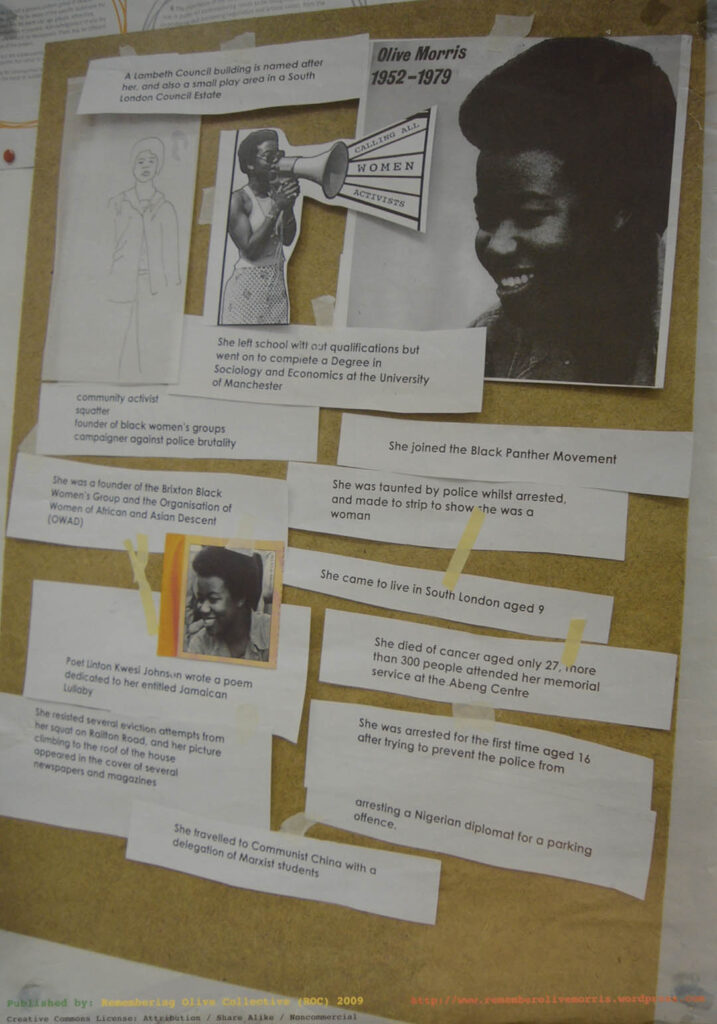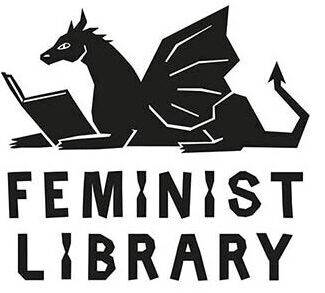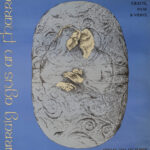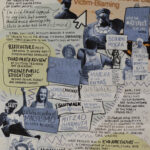Text by Anahi Saravia Herrera
‹ Return to Text by Anahi Saravia Herrera

“The Black Women’s movement is part of the world struggle for national liberation and the destruction of capitalism. Only when this is achieved can we ensure that our liberation as Black women is genuine, total, and irreversible”
Olive Morris quoted in Spare Rib No. 192, June 1998
There’s a certain loneliness that can slowly creep in as we struggle to remain organized, and to defend ourselves (and our communities) against the onslaught of racism, patriarchy, capitalism, and all the isms that make life unbearable on these isles (and everywhere), a fact made worse by the turning seasons in London and the arrival of wet, dark autumn and eventually winter. I find that it’s in these moments that it’s difficult to imagine and connect to a resistance that came before us, to find it in ourselves to feel the legacy of activists who resisted, so that we could live and resist after them.
Olive Morris was born in St.Catherine, Jamaica in 1952 and migrated to London (Brixton) at age 9. She was a community leader, and activist who worked across groups like the British Black Panthers, as well as founding the Brixton Women’s Group and the Organisation of Women of African and Asian Descent. She was a leader in the squatter’s rights movement of the 1970’s and first squatted 121 Centre on Railton Road, one of Britain’s longest-occupied squats (1981 – 1999).
To know that there were people whose feet fell on the stones that ours use to move around the city means to know that you’re part of a long line of others who wanted to change things in a place that feels big enough to swallow you whole.
Olive fought for justice for Black people and communities in Britain, and everywhere. She opposed racist police brutality and capitalist exploitation and created feminist spaces of resistance for Black women who were at the intersection of multiple oppressions.
To see the outlines of women’s groups happening in parallel timelines, to imagine activists standing in the same squares we do, to see them scaling buildings to prove that we can occupy space means knowing that those desire lines to a better world have been made before.
Olive fought for housing rights and squatted spaces to protest the existence of empty
properties in a city with long waiting lists for public housing and so much homelessness. She turned squatted buildings into community-run spaces like Saabar in London – which became a meeting space for groups like the Black Workers’ Movement and Black People Against State Harassment.
To see others track migration routes to the heart of the colonial machine, and to hear their demand for justice here and in our many diasporic homes – means knowing that we are part of a legacy of resistance that goes beyond these territories.
Olive’s legacy is militant, she was relentless, brave, committed, and passionate about her work but she also created resistance in the way she supported networks for solidarity. Carving out space in London for Black communities and groups, creating space for them to meet, support each other, and resist together.
Olive’s legacy, work, and archive are taken care of by the Remembering Olive Morris project, the Olive Morris Collection at Lamberth Archives, the Olive Morris Papers at the Black Cultural Archives, and all of those who carry her memory by continuing the work of resistance across, Brixton, London and beyond.
When it feels like we’ve exhausted our bodies and our minds, it’s life-giving to know that others have been here and have still managed to sow seeds of resistance (even in the most toxic soil). When I look around an assembly I try to see the bodies that are here and also imagine those who are here in spirit (one of the many reasons holding an assembly in a feminist library is so symbolically comforting).
Bio
Anahí Saravia Herrera (she/her) is (depending on the day) a writer, producer, creative researcher and publisher-in-training working in visual art & performance spaces. Sometimes she does these things alone but prefers not to. She is interested in exploring activism and histories of resistance and how we can use creative means to make critical perspectives public. Currently a part of peformingborders as well as in a collaborationship with Jemima Yong with whom she’s developing a publishing-as-performance-practice. She also organises feminist migrant-led campaign groups. Anahi is physically based in the “west” but as much as possible, creates work situated in the Latinx diaspora, she was born in La Paz, Bolivia.
IG: @anahi_saravia


